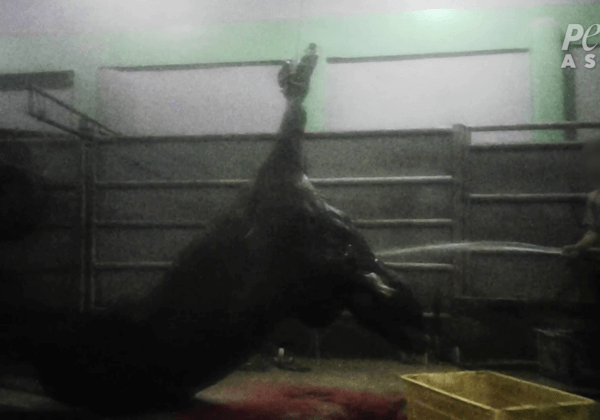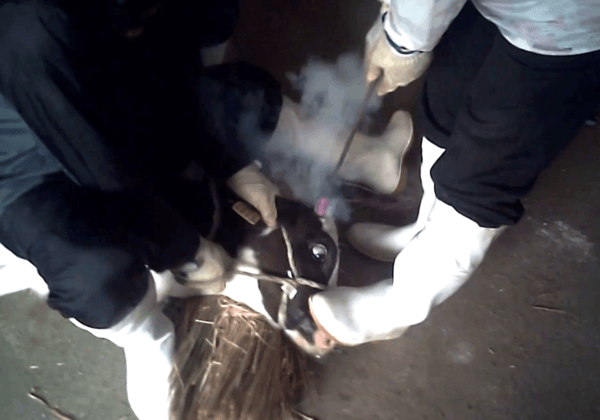Did You Fall in Love with Netflix’s ‘Okja’? Of Course You Did
We here at PETA just finished watching the Netflix original movie Okja, and—my goodness—be still our beating vegan hearts. If you haven’t seen it yet, be sure to tune in (mild spoilers ahead).
Directed by Snowpiercer‘s Bong Joon Ho and starring Ahn Seo-hyun, Tilda Swinton, Paul Dano, and Jake Gyllenhaal, this animal-rights action-adventure follows Mija, a young girl who must risk everything to prevent the powerful multinational meat company Mirando from slaughtering her best friend—a massive “super pig” hybrid named Okja.
Along the way, Mija becomes mixed up with a group of heroic (and often humorous) animal rights activists—led by the character Jay, played by the dashing Paul Dano—who work to expose the corrupt Mirando Company.
Did you fall in love with Okja? Of course you did.
Like many people and their animal companions, Mija and Okja share an unconditional love. They sacrifice their own well-being for one another. The playfulness and companionship of Okja is a firm reminder to viewers that—just like us—animals are individuals who are capable of emotions and have personalities and a will to live. They form families and friendships when given the chance.
They feel love and joy but also pain and fear.
For inspiration in creating the computer-generated character of Okja, Bong looked to three real-life animals: dogs, pigs, and manatees. Okja’s eyes alone exude all the emotion and intensity of any real-life being.
“With Okja I want to show the beauty that can exist between man and animal, and also the horror between them,” said director Bong.
Horror, indeed: Animal agriculture is a real-life nightmare full of campy propaganda.
This film reaches its climax in the confines of a concentration camp-like factory farm where hundreds of other “Okjas” are being slaughtered, mimicking the bloody everyday reality for cows, pigs, chickens, and other animals around the globe. The scenes are intentionally realistic and disturbing, as Bong thought it would be a disservice to the movie if they were watered down.
It’s revealed that Mirando gave out these “super pigs” to farmers around the world to be raised humanely and naturally as a publicity stunt to cover up the horrific reality of animal slaughter.
Sounds an awful like the “humane” meat lie, doesn’t it?
During a news conference for Okja, Swinton spoke to the heart of this film:
I live outnumbered by animals. You can read them as a lesson to all of us on how to live—loyalty patience, presence, love of a good walk, catching a ball, whatever. The feeling of dedication and simplicity that animals can teach us.
It’s a very important directive at a time when capitalism is really upping its game to trick us that we are more consumers than sentient beings, more than people who love each other. We have to guard against these tricks. And I think the film offers a corrective against this trickery.
This film keeps the characters in near-constant motion, and your “feels” will move just as much! Props are in order to Bong Joon Ho and Netflix, which has hosted numerous great animal rights films such as Blackfish and Cowspiracy!
25 million “Okjas” were killed in 2013 in the Philippines alone and 726 million pigs slaughtered that year in China.
Like dogs—and Okja!—pigs are friendly, loyal creatures who are playful and affectionate. They’re intelligent, and they love to snuggle. But on factory farms, they’re denied everything that’s natural and important to them. Just like the heartache that Mija feels when Okja is ripped away from her, mother pigs experience this every time that they’re denied the opportunity to nurture their young. Mother cows also grieve and cry out as their babies are routinely ripped away from them shortly after birth so that their milk can go to humans.
Pigs on factory farms never get to take a breath of fresh air, and extreme crowding and filth cause rampant disease. Mother pigs are kept in tiny, barren crates so small that they can’t even turn around. The tails of piglets are cut off, their teeth are clipped, and male pigs are castrated—all without any painkillers.
Their brief lives end when these sensitive animals are hung upside down and their throats are slit, often while still fully conscious.
What You Can Do
Anyone who’s inspired by Okja and horrified by the suffering that real pigs endure for the meat industry can help animals in their own lives by simply not eating them. With many delicious recipes to choose from and dining-out tips, our ‘How to Go Vegan‘ page makes it easier than ever to make the switch.








